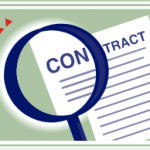Caveat Emptor and a Buyer’s Duty to Investigate Real Estate Purchase
We blogged about a Charlottesville Circuit Court case in which the court analyzed the duty to disclose for a seller of residential real estate. We wrote another post regarding that case discussing an exception to the rule of caveat emptor. Specifically, if the seller attempted to “divert” the purchaser’s attention away from problem areas, a court could find fraud and rescind the contract.
However, in Virginia, if a prospective home purchaser discovers information alerting him to a potential problem, that person is charged with knowledge he would have found had he diligently pursued the inquiry. That rule was highlighted in an unpublished opinion released by the Virginia Supreme Court. This blog post reviews the facts of that case and the lessons to learn for real estate sellers and buyers.
Continue reading “Caveat Emptor and a Buyer’s Duty to Investigate Real Estate Purchase”
Part 2 of The Rule of Caveat Emptor in the Sale of Real Estate vs. a Seller’s Duty to Disclose
We wrote earlier about a Charlottesville case in which the court analyzed the duty to disclose for a seller of residential real estate. Although Virginia follows the general rule of caveat emptor, the court ruled that the seller, who was also a licensed real estate agent, may have violated a duty to disclose material adverse facts.
The purchasers alleged two other counts, alleging that the seller failed “to disclose the adjacent drain problems and history of flooding, constituting both fraudulent misrepresentation and constructive fraud.” The court dismissed those claims while providing a nice, succinct history of the law of fraud in the sale of a home. This blog post reviews the general rules of fraudulent misrepresentations in residential real estate sales.

Neighbor Law: Tips for Avoiding Boundary Line Disputes
Few real estate topics cause more disputes between owners than those involving activities at a common boundary. We have reviewed boundary line disputes involving trees that straddle property lines and fences that encroach upon boundary lines.
A recent Portsmouth case highlights another issue relating to boundary lines.

Continue reading “Neighbor Law: Tips for Avoiding Boundary Line Disputes”
One important tip for your construction project – Change Orders
The DPOR regulations require Class A Contractors to obtain written change orders “which are signed by both the consumer and the licensee.” This requirement sounds pretty reasonable and easy to maintain, yet the reality is that many contractors fail to fully comply with this provision, leading to possible problems down the road.

In litigation, you can’t always get what you want (especially if you don’t ask)
It’s a fundamental rule in Virginia that the Plaintiff (the person filing a lawsuit) can only recover the relief requested in the Complaint. In a recent unpublished decision, the Virginia Supreme Court reaffirmed the requirement that a party can only get relief if they ask for it.
Continue reading “In litigation, you can’t always get what you want (especially if you don’t ask)”
Do the Virginia Rules of Evidence change settlement negotiations and mediations?
Virginia’s new codified Rules of Evidence became effective on July 1, 2012. In an article in Virginia Lawyers Weekly, five of the rules were highlighted. One of those highlighted rules was Rule 2:408, “Compromise and Offers to Compromise.” The terms of this rule differ from the terms of the Federal Rule of Evidence 408, but those differences will not be explored in this post. Instead, this blog post will review Virginia Rule of Evidence 2:408, and its possible implications for settlement discussions and mediation.
Continue reading “Do the Virginia Rules of Evidence change settlement negotiations and mediations?”
Update on using work email – American Bar Association says lawyers must caution clients of risks
We continually warn about the use of work email accounts to correspond with your attorney:
- 3 tips for safe emailing with your attorney;
- Using a company computer to email your attorney may be a bad idea
- Emails from work computer can waive rights to privileged communications
The American Bar Association has now opined that lawyers should “warn the client about the risk of sending or receiving electronic communications using a computer or other device, or e-mail account, where there is a significant risk that a third party may gain access.” Although the ABA’s opinion is not binding upon any state regulatory bar association, it is likely that state bar associations, like the Virginia State Bar, will review this opinion with interest.

Client Email
Most of our communications are not private, even though we think they are. Work emails are not secure. Regardless of whether lawyers are required or suggested to warn clients, it is not a good idea to use your work email account to email your attorney.
Tarley Robinson, PLC, Attorneys and Counsellors at Law
Williamsburg, Virginia
Attorneys’ Fees and Litigation – When fees get awarded to the “Prevailing Party”
In litigation matters involving common interest communities (otherwise known as homeowners associations (“HOAs”) or condominium owners associations (“condo associations”)), the issue of awarding attorneys’ fees for prevailing parties ultimately arises. Generally, the HOA’s Governing Documents or the condo association’s Condominium Instruments contain such a provision. Otherwise, attorneys’ fees may be recoverable by statute for HOAs and condo associations.
These attorney fee-shifting provisions, either by contract or statute, are contrary to the typical “American Rule” cases in which each side pays their own attorneys’ fees. Because litigation has become so expensive to pursue, whether to award attorneys’ fees, and the amount of any award, has become separate litigation on its own at the conclusion of cases.
In the recent case of Dewberry & Davis, Inc. v. C3NS, Inc., the Virginia Supreme Court was faced with the issue of “whether the circuit court erred in applying an attorneys’ fees provision of a contract.” We had previously blogged about this case, because in the underlying contract between the parties, Dewberry & Davis, an engineering company, had limited its liability for damages. The trial court had determined the limitation of liability clause was void, pointing to a recent change to Virginia Code § 54.1-411that permitted an engineering company to include a limitation of liability clause. Because the contract predated the code change, the court determined that those changes “demonstrate that the General Assembly fully intended to alter the statute’s intent.”
The case continued to trial, and eventually, upon appeal, to the Virginia Supreme Court. This blog post explains that Supreme Court decision relating to the award of attorneys’ fees.
Continue reading “Attorneys’ Fees and Litigation – When fees get awarded to the “Prevailing Party””
When is a “Contract” not a Contract?
We know that in Virginia, the parties to a contract are bound to the terms of that contract. We also know that Virginia courts look to the terms of that contract to determine each party’s rights and obligations. But what is a “contract?” This blog post looks at a recent Virginia Supreme Court case that gives a little guidance to answer that question.
Oral Contracts are enforceable, but . . . .
Many times, parties enter into informal loan agreements on a simple oral promise to “pay it back.” Similarly, others will enter into oral agreements to perform residential construction projects, or other types of projects. When things do not go as expected and the promises are of a value worth litigating over (or one of the parties to the promise thinks they are) things can go swiftly downhill.
Continue reading “Oral Contracts are enforceable, but . . . .”








